MarketMuse vs SurferSEO
When it comes to SEO and optimizing your website for search engine rankings, there are many powerful and popular tools out there. In this article, we will review and compare MarketMuse and Surfer SEO. Both of these tools offer a range of features that can help you improve your website’s visibility in search engine results pages (SERPs).

But which of the two performs better and is right for your specific business needs?
Tldr
Both platforms offer comprehensive solutions for improving website visibility and performance, but they differ in features, pricing, and capabilities. MarketMuse offers more advanced and comprehensive features than Surfer SEO, such as AI-driven insights and automated content optimization. This makes it ideal for larger websites with complex content.
Compared to MarketMuse, Surfer SEO is more affordable and provides a wide range of beginner-friendly features, such as its intuitive user interface that makes it easy to analyze website content, identify keyword trends, and create content strategies. It also provides keyword research features, allowing users to find the best target keywords for their websites quickly.
Let’s review and compare both tools.
An overview of MarketMuse vs Surfer SEO
The table below gives a comparative overview of some of MarketMuse’s and Surfer SEO’s most prominent features.
| MarketMuse | Surfer SEO | |
| Competitor analysis | Yes | Yes |
| Competitive content analysis | Yes | No |
| Content score | Yes | Yes |
| Content inventory | Yes | No |
| Content (topic) clusters | Yes | Yes |
| Content planning | Yes | Yes |
| Personalized difficulty score for relevant keywords | Yes | No |
| Keyword research | Yes | Yes |
| Questions | Yes | Yes |
| Optimize | Yes | Yes |
| SERP analyzer | Yes | Yes |
| Content editor | Yes | Yes |
| Content outline (content brief) | Yes | Yes |
| First draft | Yes | No |
| Topic modeling | Yes | Limited |
| SERP rank tracking | Yes | No |
| Natural language processing (NLP) | English and Spanish | English, Danish, Dutch and Polish (more languages available with Google's NLP API) |
| Integrations for Google Docs and WordPress | Yes | Yes |
What is MarketMuse?
MarketMuse is an AI-powered content optimization platform that helps content marketers and other writers create high-quality content that is optimized for search engines. It uses advanced algorithms and natural language processing (NLP) to analyze a website’s existing content and suggest the topics and keywords you need to include in new pieces to help them rank higher in search results.
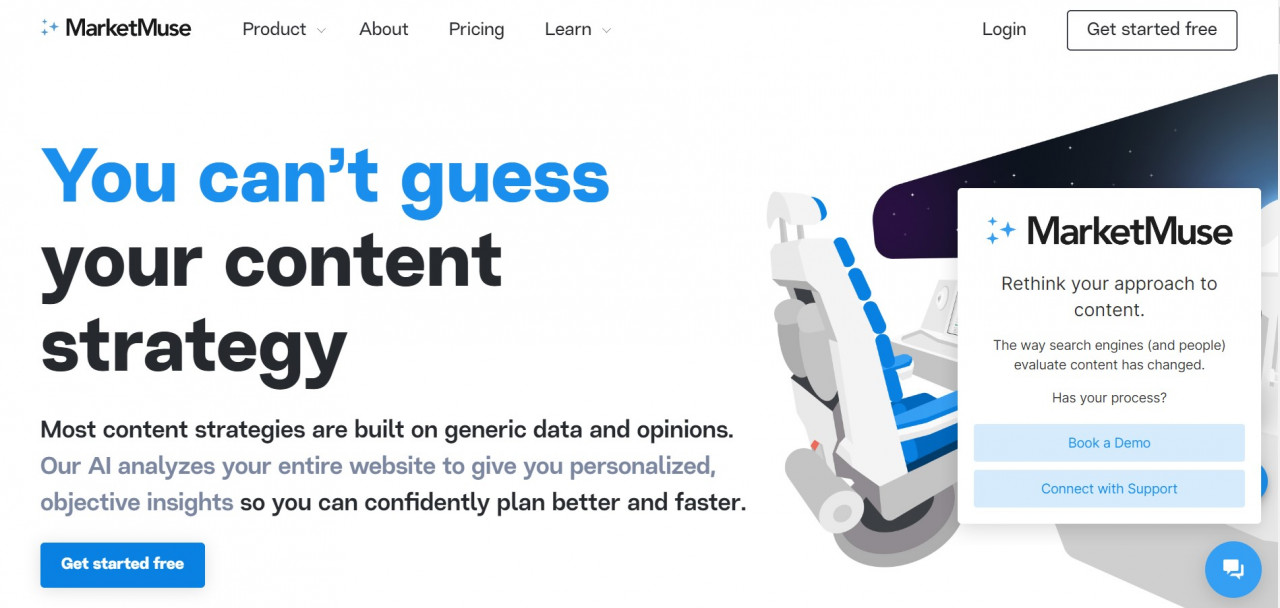
MarketMuse also provides detailed insights into how well a website performs in terms of SEO, helping users identify areas for improvement.
MarketMuse features
MarketMuse provides a comprehensive suite of features to help marketers create high-quality, SEO-friendly content. Here’s an overview:
- Competitive content analysis tool;
- Content inventory;
- Content planner;
- Content (topic) clusters;
- Topic tracking & ROI tracking.
- List of frequently asked questions;
- Keyword research tool;
- Personalized difficulty score for relevant keywords;
- Content brief and first draft;
- Optimize;
- External and internal link-building suggestions;
- Works with English and Spanish.
What is Surfer SEO?
Surfer SEO is a full-fledged, on-page content optimization platform that uses artificial intelligence to analyze top-ranking pages for a given keyword and provides detailed insights into how those pages are structured and which keywords they use.
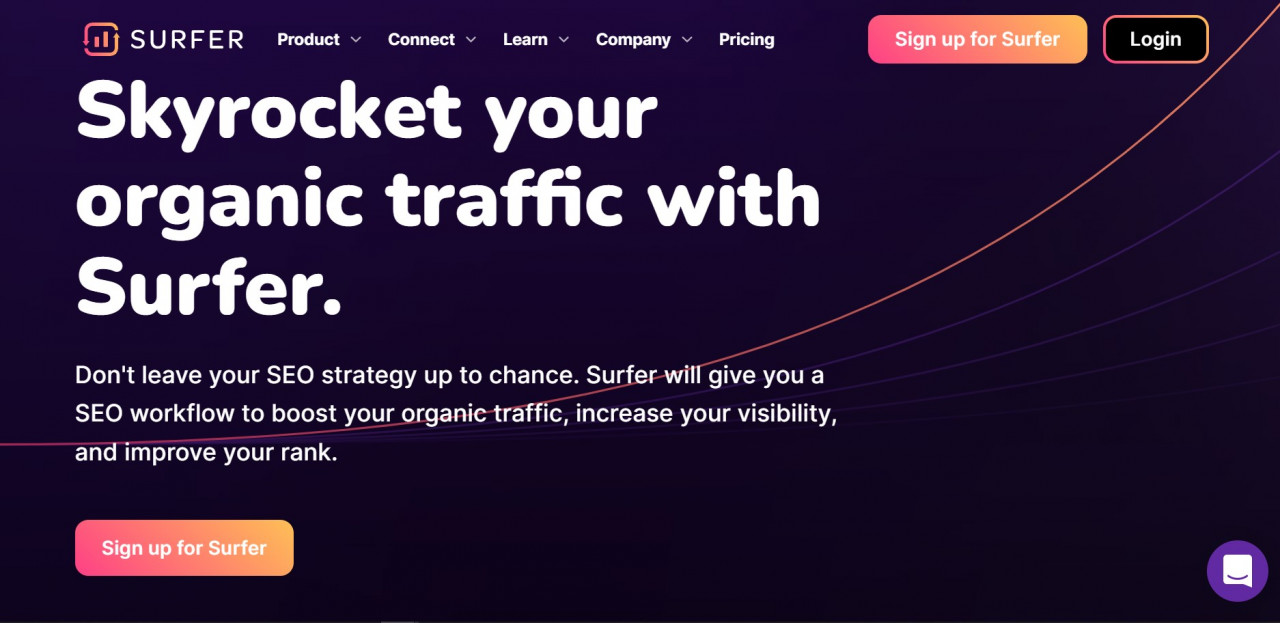
With this information, the platform provides recommendations for optimizing your page's content so you can rank higher in search results. Surfer SEO also provides insights into competitor pages, allowing users to see what their content will be up against. This information can then be used to optimize content so it has a higher ranking potential in SERPs.
If you love making decisions based on hard data, Surfer SEO is the tool for you. However, if you are not so much into analyzing reports but more of a quick, actionable data type of person, then you might want to consider other alternatives.
Surfer SEO Features
Surfer SEO offers a range of features designed to help users optimize their content for search engine rankings, including keyword research, on-page optimization, and competitor analysis. Below is an overview of the most prominent Surfer SEO features:
- SERP analyzer (in-depth analysis of Google’s first page)
- Content density
- Keyword density and frequency
- Page speed
- Hidden content, and more.
- Content editor
- Keyword research (formerly Content planner)
- NLP-powered sentiment analysis
- Surfer NLP for English, Danish, Dutch, and Polish
MarketMuse vs Surfer SEO: In-depth features comparison
Let’s take a moment to briefly compare these tools before exploring some of their differences in more detail.
When it comes to topic modeling, MarketMuse uses comprehensive web content research to construct in-depth topic models, while Surfer generates a lot of unconstructive one-word topics and their variations.
For content planning, MarketMuse offers a Content planner that allows users to easily create and manage their content strategy. Surfer SEO’s Keyword research tool (formerly Content planner) is helpful for keyword recommendations but does not do the trick for creating a content strategy as Surfer does, as it doesn’t have the personalized metrics needed.
When it comes to content analysis, MarketMuse offers a comprehensive competitive content analysis tool, which also gives you a content score for each URL. Surfer SEO’s SERP Analyzer on the other hand, can overwhelm you with data without providing actionable insights.
MarketMuse takes the lead for content optimization, providing you with a personalized difficulty score, word count, and related topics. Surfer SEO, on the other hand, does not provide a content score. It gives you a list of target keywords, but their layout is without order by relevance or frequency of use. Both platforms can help you with external and internal link-building as part of your SEO content optimization.
MarketMuse’s content creation process includes content briefs, content inventory, and content editing. Surfer SEO’s AI outline generator offers a content outline and AI-generated paragraphs.
Google Docs is integrated into both MarketMuse and Surfer SEO.
Application and user interface (UI)
MarketMuse has a very straightforward user interface (UI) with a vertical menu on the left side of the application and a horizontal menu bar at the top. Both menus offer a range of capabilities and functionalities that users can access with a few clicks. On the vertical menu, users can choose between several different applications - research, compete, optimize, questions, and connect - that set the editor in different modes depending on the task.
For instance, within the research application, users can enter a topic or a keyword, and MarketMuse will produce related topics and keyword clusters ordered by relevance. The competitive application gives insights into your competitors’ content, while the optimize application generates suggestions for improving your own content piece.
Similarly, Surfer SEO's application is intuitive and powerful, with several different functionalities that help content creators optimize their web pages for search engine optimization (SEO). It has a vertical menu on the left side where users can access its main tools: the content editor, content planner, SERP analyzer, and keyword research tool.
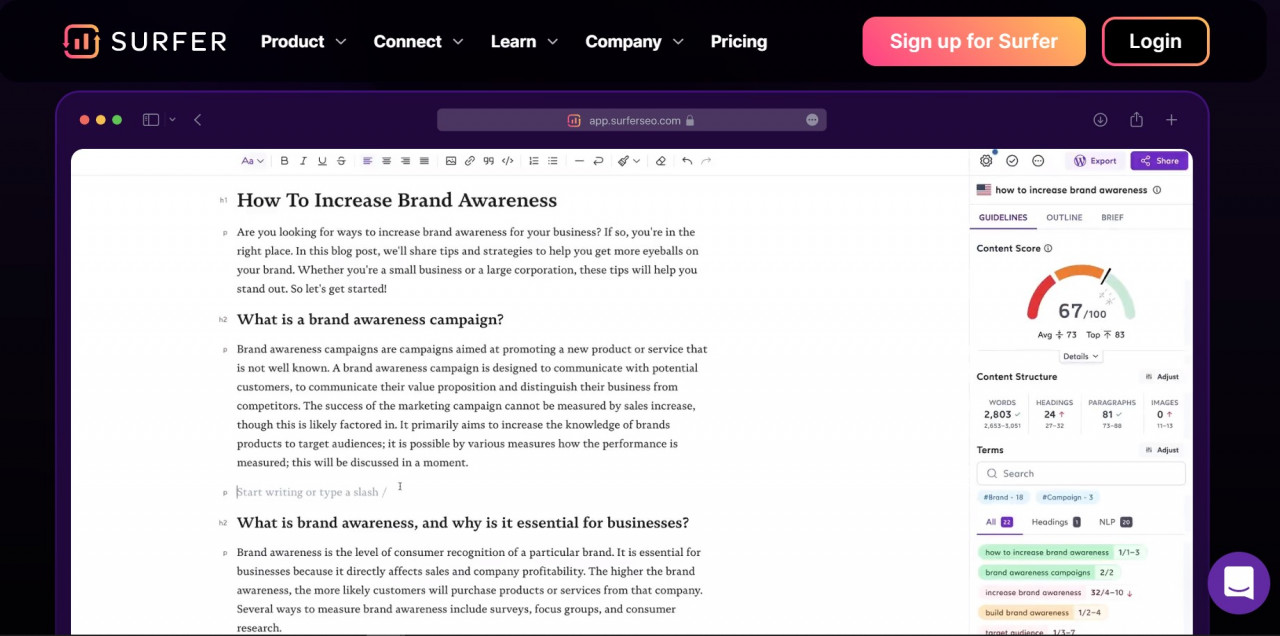
When choosing the content editor, for example, users should add their most relevant keywords and choose a SERP location. Based on this information, Surfer analyzes the top-5 pages with the highest rank on Google and provides structure and content guidelines that assist users in writing their content piece.
Content analysis and optimizing
Webpage analysis and suggestions
Both MarketMuse and Surfer SEO offer powerful tools to improve content ranking. MarketMuse's Competitive content analysis feature helps identify content strategy gaps, while its optimize feature gives actionable insights into keyword density and readability scores.
Surfer SEO’s Audit tool provides an in-depth analysis of a website’s content, structure, and performance. It checks elements such as page title tags, meta descriptions, and much more to provide detailed metrics such as word count, keyword density, and NLP entity coverage.
MarketMuse's competitive content analysis feature is a powerful tool that helps content creators and marketers identify gaps in their content strategy. It provides an in-depth analysis of the competition, allowing users to see what topics are being covered by competitors, as well as what aspects of the topic are covered. The tool also provides actionable insights into keyword density, readability scores, and other important metrics.

Another feature which you can improve your content’s ranking with is MarketMuse's Optimize feature. This tool allows content writers or marketers to directly paste their content piece and see on the right-hand side several counters that indicate how that piece performs. There are counters indicating whether the piece has reached specific standards and where it stands when directly compared to the competition.

Comparable to these features is Surfer SEO Audit, which is a comprehensive tool that helps website owners and marketers identify ways in which they can improve their websites for better search engine rankings. It provides an in-depth analysis of the website’s content, structure, and overall performance to identify potential issues hindering its success, as well as recommendations on how to improve it. It also gives you a list of the best ranking organic competitors.
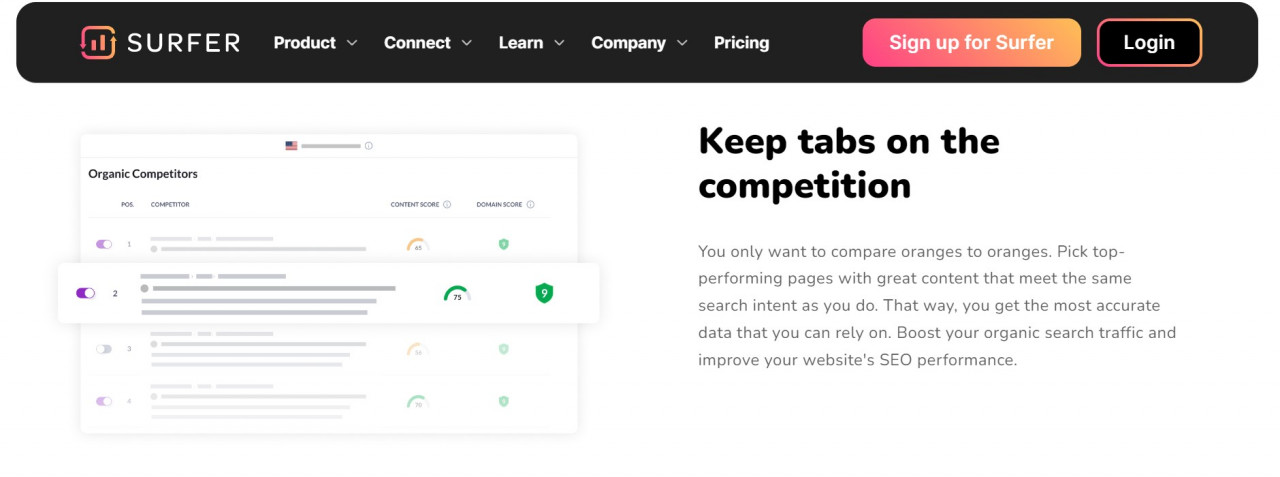
It takes Surfer SEO Audit a minute to go over SEO elements such as page title tags, meta descriptions, content headers, word count, page speed, and mobile friendliness - to name just a few. This tool gives you a detailed overview of your web page’s SEO metrics, feeding you with insights on word count, keyword density, number of headings, NLP entity coverage, internal links and backlinks you might want to add to your content, meta tags structure, and more.
Topic recommendations
When analyzing top-performing content, Surfer SEO uses a special topic modeling feature that allows users to quickly identify the most important topics related to their content, as well as the best keywords to use to optimize it for search engine rankings.
The feature uses natural language processing (NLP) algorithms to analyze web pages and extract key topics from them. This helps users determine which topics are trending and gives them insights about related topics they could incorporate into their content or link to for better positioning in SERPs.
MarketMuse also uses artificial intelligence (AI) and natural language processing (NLP) technology to analyze your website's content and identify areas for improvement. With these algorithms, MarketMuse analyzes the topics covered in your content, how well they are covered, and how relevant they are. It then provides insights into how your content performs compared to competitors' content on the same topic. The platform suggests trending headings and target keywords and offers synonyms that may enhance the readability of your content.
While both platforms offer a plethora of features for analyzing and optimizing content, MarketMuse has the edge thanks to its more in-depth approach and personalization capabilities. Surfer SEO offers a lot, but the main drawback of this platform is its lack of customization.
Unlike MarketMuse, which allows users to customize their content optimization strategy, Surfer SEO offers a one-size-fits-all approach, so users aren’t able to tailor the optimization process to their specific needs and goals.
Content strategy and planning
Content clusters are a way to organize content around a specific topic or keyword so that it can be found more easily by search engines. They’re an essential part of any SEO strategy, and MarketMuse has one of the best features for creating them.
With MarketMuse, users can create content clusters quickly and easily, allowing them to focus on other aspects of their SEO strategy. Thanks to the content clusters, as well as the content inventory feature, users can quickly identify writing opportunities and create a powerful content strategy that has a real SEO impact.
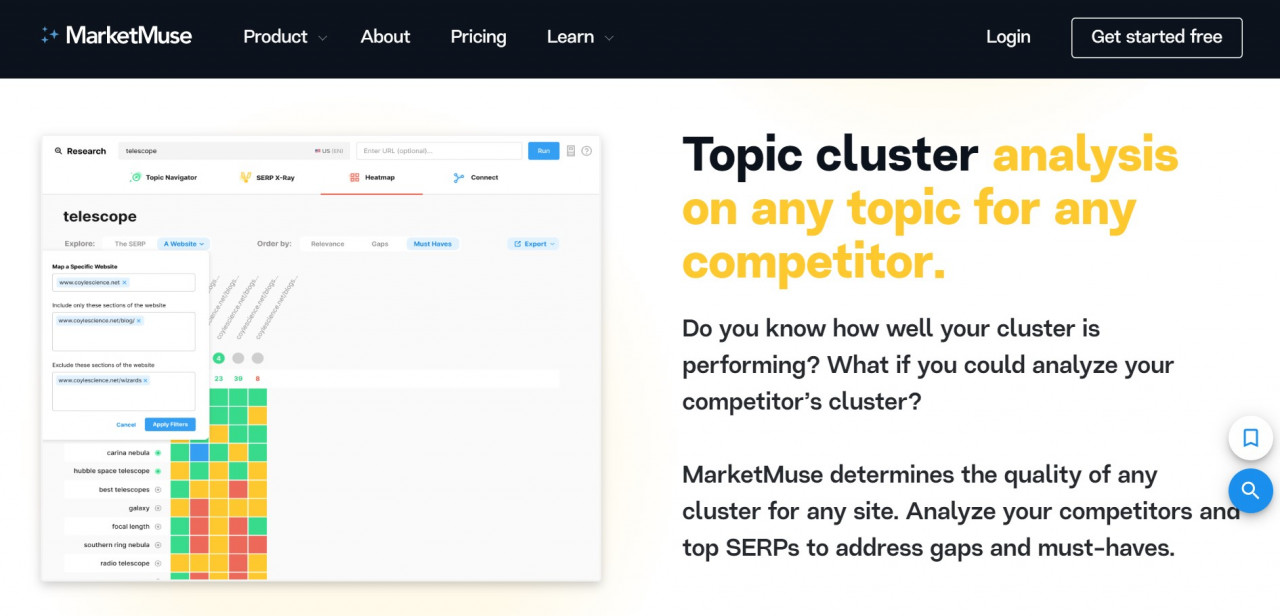
Another powerful feature for this purpose is MarketMuse’s questions application. Here, users can understand the intent behind each search query, see what questions are asked on Google related to the topic at hand (or provided keyword), create subheadings, and a Q&A section for any topic.
In this aspect, MarketMuse used to have quite the advantage, but Surfer SEO recently added a new feature - a content planner (still in beta), which provides less advanced yet comparable features to MarketMuse for planning your topic clusters and content strategy. The content planner allows users to find secondary keyword opportunities, build topic relevance with clusters, analyze keyword difficulty, and see which topics typically rank together.
Yet another feature unique to MarketMuse is its Content inventory, which can save writers and content marketers invaluable research time by providing them with metrics and workflows that facilitate spotting the best content opportunities on a given topic.

MarketMuse's Content inventory provides detailed information about your existing content and suggests the changes necessary to achieve higher search engine rankings. Furthermore, it gives you an advantage by showing you how well your competition is doing with your topics of interest.
This feature is complemented by the Personalized difficulty score, which we’ll talk about in more detail further down.
Keyword research
Regarding keyword research, both platforms offer a wide range of features and functionalities, so you can find just the right words to rank your content higher on search engines.
The main difference between the two is that while MarketMuse is focused on search intent and Q&A sections to improve rankings, Surfer SEO analyzes trending keywords based on Google’s top 5 results for a specific topic. It also provides users with a free keyword Surfer extension for a quick glimpse of related keywords for every search query.
Still, this might not be enough to beat MarketMuse’s advanced keyword features.
MarketMuse has powerful keyword research functionalities that use advanced algorithms to analyze search engine data and provide detailed insights regarding focus topics and keywords most likely to drive traffic to a website. By giving you the right keyword suggestions, this great tool makes sure that you understand users’ search intent and answer the questions that they write as a search query.

On the other hand, Surfer SEO’s keyword research tool uses natural language processing and machine learning algorithms to analyze search engine results pages (SERPs) and provide insights into what topics are trending in the SERP landscape. With Surfer SEO, users can quickly find the right keywords that will help them rank higher in search engine results.

On top of that, Surfer SEO provides the keyword surfer extension (extension for Google Chrome) that can help you with content and keyword research. This extension gives you data such as average word count and keyword search volume for every search phrase you input, as well as the number of times you have used a specific target keyword in top-ranking SERPs.
While this is more than enough for most, when compared to MarketMuse, Surfer SEO still lags as its keyword research tools are not as comprehensive as MarketMuse's suite of keyword research and analysis tools. MarketMuse provides a more detailed look at search engine optimization (SEO) performance metrics, such as keyword difficulty scores, related topics, and content gaps.
Yet another amazing feature offered only by MarketMuse is the Personalized difficulty score for relevant keywords. This score is based on the quality and quantity of content already published on a specific subject, and it can assist your content team in evaluating the difficulty of ranking for a chosen keyword. On a scale from 0 to 100, a higher score means greater difficulty to rank in search results.

MarketMuse's Content inventory and Personalized difficulty score can take the guesswork out of managing your website's SEO performance, so it wouldn’t be a stretch to say that MarketMuse could be the best Surfer SEO alternative.
Natural language generation tеchnologies
Content creators and marketers are constantly looking for ways to boost their productivity. One of the most powerful tools at their disposal is natural language generation (NLG). NLG is an AI-based technology that creates content for web pages and blogs using data analysis and various information sources.
MarketMuse and Surfer SEO both offer natural language generation, but they differ in their approach.

MarketMuse employs NLG (especially in topic modeling) as a basic platform component, whereas Surfer uses NLG through external APIs.
Due to this, MarketMuse has several benefits over Surfer SEO regarding its ability to analyze complete webpages or individual pages, source information from various sources, and utilize machine-learning algorithms to ensure content harmony.
However, MarketMuse provides language support only for English and Spanish, while Surfer SEO offers English, Danish, Dutch and Polish (and even more languages are available with Google's NLP API).
Content generation
As we’ve seen, AI-based technologies such as NLP, NLG, and machine learning algorithms are becoming so powerful that they can automatically generate optimized titles, subheadings, and even paragraphs. But what about generating whole content pieces?
MarketMuse provides rich summaries generated by pulling data from different sources such as Google and Wikipedia. These summaries can then be incorporated into blog posts, web pages, or other online content. Machine learning algorithms are employed to generate additional relevant keywords and topics.
MarketMuse’s content brief comprises two sections: summary brief and outline brief. The tool is designed to help content writers scale up content production by generating detailed briefs with all the necessary information at hand.
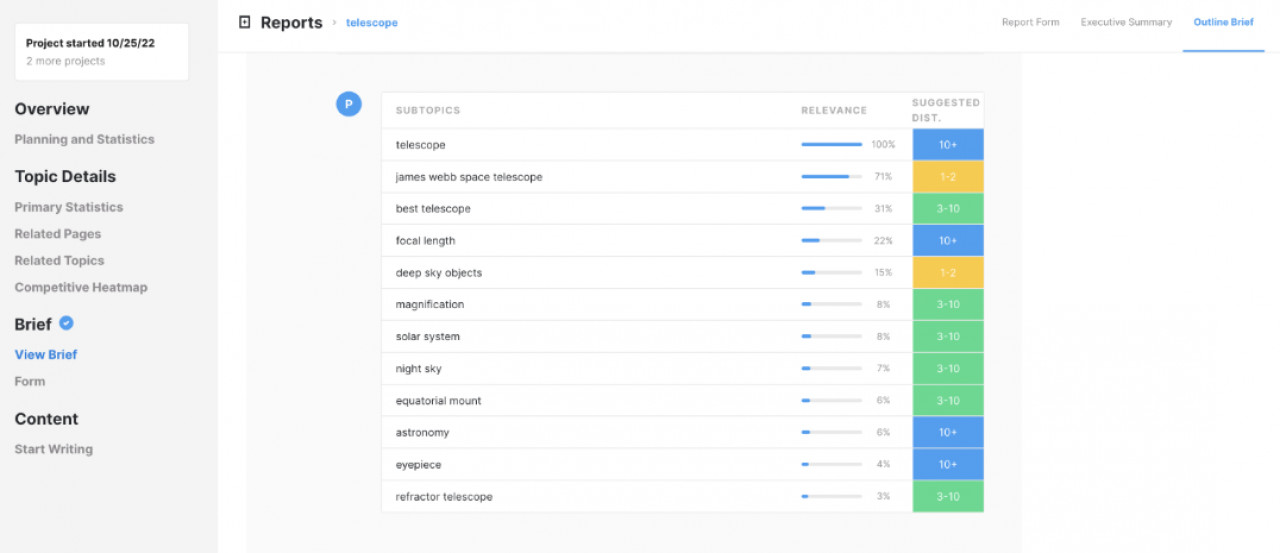
Similarly, Surfer SEO’s AI outline generator produces an outline for your target keywords that uses AI to generate titles, subheadings, and even unique paragraphs (in a right-side menu). Users can take it from there and choose which ones they think best fit their article structure.
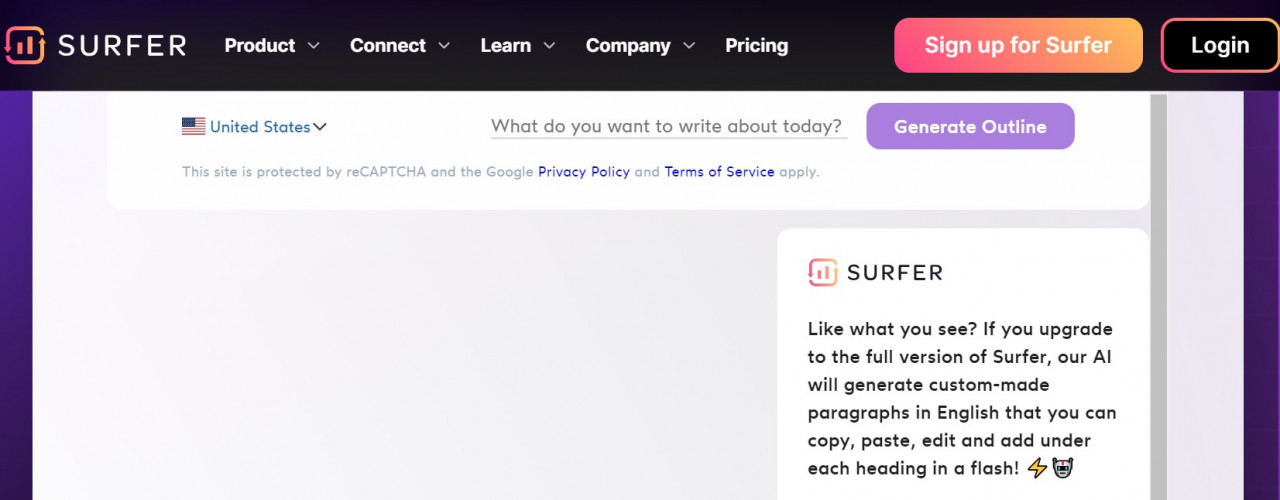
As we’ve seen, both MarketMuse and Surfer SEO provide automated content briefs that give users an in-depth look at their chosen topic by using vast libraries of topics and keywords. These briefs can serve as an excellent foundation for further exploration and can be a great aid to content creators when it comes to writing quality content more efficiently.
However, MarketMuse goes a step further than just providing recommended keywords, summaries, or brief paragraphs. The emphasis is on delivering comprehensive details concerning each theme addressed in the briefs, giving sound advice regarding how to present this information to maximize SEO rewards for search engines, and even generating full content drafts.
Thanks to its first draft feature, MarketMuse allows users to generate an initial first draft of an article that they can later fine-tune manually. This is beyond Surfer SEO’s pay grade.
Surfer’s content outlines are simpler and more superficial compared to those of MarketMuse, which are highly detailed and structured.
Integrations
When it comes to integration with other useful tools for content marketing, Surfer SEO has the advantage over MarketMuse as it offers a lot more options for integrating with other SEO tools and apps.
MarketMuse offers a Google Docs add-on and a WordPress plug-in.
Surfer's free Chrome extension simplifies the process of using Surfer SEO in WordPress, Jasper AI, and Google Docs. It lets you connect with SEMRush to determine your competitors' indexed backlinks.
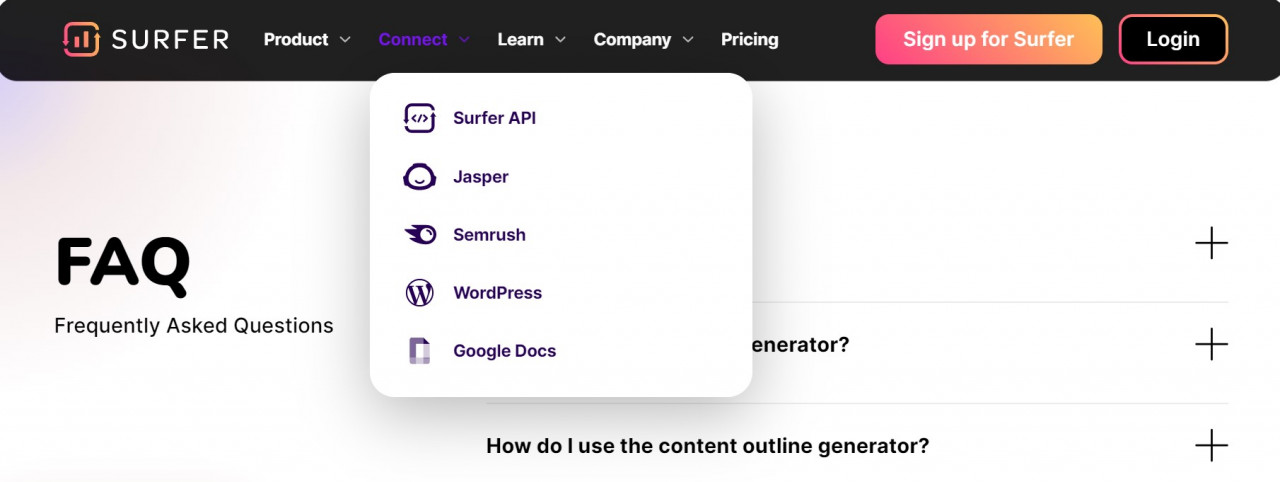
All these integrations can help you modify, update, or enhance your performance.
MarketMuse vs. Surfer SEO pricing plans
MarketMuse’s pricing model is based on the number of topics and keywords users want to optimize. The pricing structure is tiered, with different access levels depending on the project size. For example, the Basic plan allows users to optimize up to 10 projects and 10 queries per month, while the Standard plan and the Professional plan allow users to optimize unlimited projects and up to 100 queries per month.
Surfer SEO’s pricing plans are cheaper, but it’s questionable how much value they offer at each tier.
MarketMuse also tops SurferSEO by offering a free plan with no time limit. SurferSEO does not give you such an option.
You can learn more about both platforms’ pricing plans below.
MarketMuse pricing plans
MarketMuse's three plans on offer are the Free, the Standard, and the Premium plan.
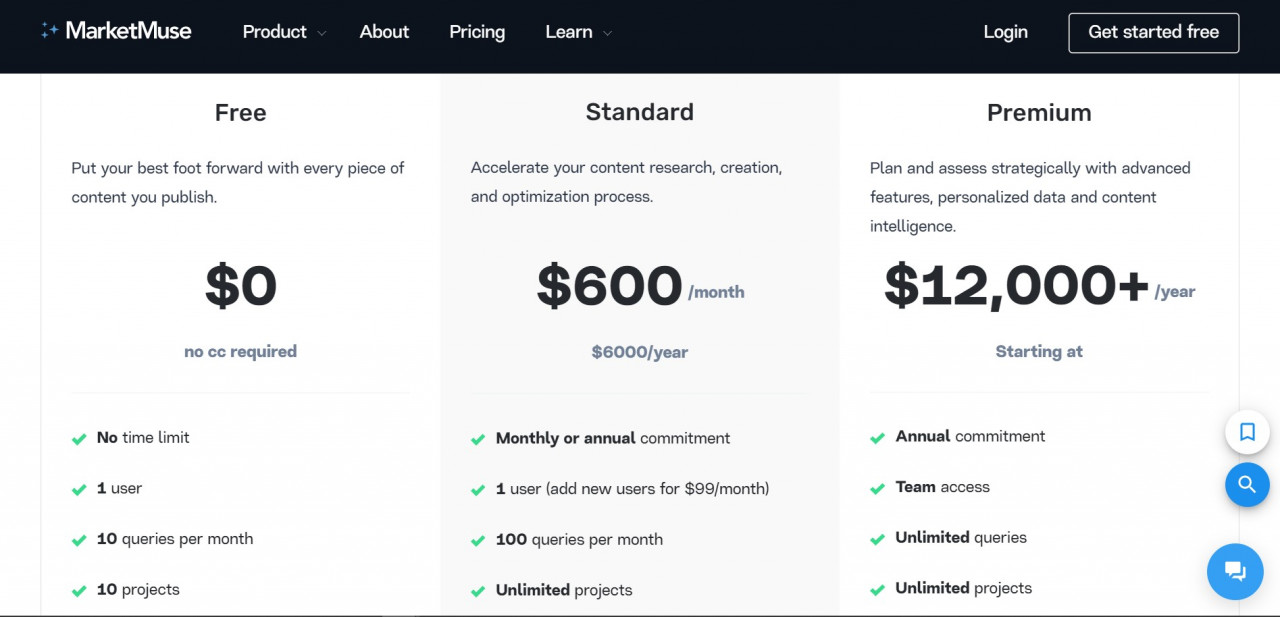
Free plan
The Free plan offers ten projects and queries per month, unlimited time for a single user, but limited data output. It's a great way to explore and get comfortable with the application before considering upgrading to a more advanced plan.
Standard plan
The Standard plan is designed for one user and costs $600 per month or $6000 annually. Additional users can be added for an extra fee of $99 per month. With this plan, you'll have access to 100 monthly queries, limitless projects, the capability to export data, and full output of application data.
Premium plan
The Premium plan begins at $12000 annually and can be scaled up. This package includes team access, unlimited queries, domain content audit, domain analysis with any number of pages, managed topics tracking, and unlimited content briefs - all in addition to the features offered by the first two packages. It includes account management personnel, platform education, and workflow coaching.
Surfer SEO pricing plans
Surfer SEO offers four pricing plans: Basic, Pro, Business, and Enterprise.

Basic plan
The Basic plan is the most affordable option at only $49 per month. It is the perfect option for freelance content writers and small businesses as it is meant for one user.
You can use the Content Editor to write and optimize up to 120 articles per year and the Audit tool for up to 240 pages per year.
This plan provides you with advanced Keyword Research and SERP Analysis deep dive.
The Grow Flow feature works with a Google Search Console account, and it allows you to:
- Optimize and track two high-impression websites per month (with the option to add extra websites for $11 per site) and get weekly SEO insights;
- Optimize and track an unlimited number of low-impression websites and receive tailored content optimization suggestions on your topic of choice.
Pro plan
The Pro plan is the most popular option at $99 per month, best suited for medium businesses working with more than one website. This plan offers three user seats.
You can annually write and optimize up to 360 articles using the Content Editor, while the Audit tool is at your disposal for up to 720 pages per year.
This plan, too, offers advanced Keyword Research and the SERP Analysis deep dive.
The Grow Flow feature lets you:
- Optimize and track five high-impression websites per month (with the option to add extra websites for $11 per site) and get weekly SEO insights;
- Optimize and track an unlimited number of low-impression websites and receive content optimization suggestions for any topic of interest.
Business plan
The Business plan costs $199 per month, can be used by 10 content writers and is appropriate for large organizations having ten or more websites.
You can use the Content Editor to write and optimize up to 840 articles per year and the Audit tool for up to 1680 pages per year.
It also provides advanced Keyword Research and the SERP Analysis deep dive.
The Grow Flow feature lets you:
- Optimize and track ten high-impression websites per month (with the option to add extra websites for $11 per site) and get SEO insights every 7 days;
- Optimize and track an unlimited number of low-impression websites and receive tailored content optimization suggestions on your topic of choice.
This and the Enterprise plan offer white labeling and access to Surfer’s API.
Enterprise plan
The Enterprise plan is a fully customizable plan that offers a personalized experience and scalable individual contracts for enterprises. It can be used by an unlimited number of content writers, and it is appropriate for large organizations having ten or more websites.
You can use the Content Editor to write and optimize as many articles as you need and the Audit tool for any number of pages.
It also provides advanced Keyword Research and SERP Analysis.
The Grow Flow feature lets you:
- Optimize and track more than ten high-impression websites per month and get weekly SEO insights;
- Optimize and track an unlimited number of low-impression websites and receive tailored content optimization suggestions on your topic of choice.
In addition to white labeling and access to Surfer’s API, also offered in the Business plan, Enterprise provides you with product training, a dedicated customer success manager, premium support, and legal assistance.
All Surfer SEO plans also offer NLP-enhanced guidelines.
Final verdict
The main difference between MarketMuse and Surfer SEO is that MarketMuse is more inclusive and offers more features, while Surfer is more affordable and easy to use. Its main selling point is the SERP analyzer, while MarketMuse is the more robust and out-and-out software solution.
Because of this, MarketMuse is more suitable for large enterprises and companies that want to rely fully on the tool for all their content needs, while Surfer is a great choice for anyone who wants that additional boost in their SEO strategy.
That said, at the end of the day, the decision between MarketMuse and Surfer SEO should be based on two things: your content strategy and how much you are willing to spend.
MarketMuse is more expensive, but it makes up for that with its many advanced features. For instance, MarketMuse offers personalized difficulty scores and metrics, website analysis, and a content inventory tool for content planning, all of which are missing in Surfer SEO.
Additionally, MarketMuse analyzes competitors’ content, identifies content gaps, and provides suggestions that will make your content piece more competitive, whereas Surfer is focused on analyzing Google’s first page with the SERP analyzer feature.
Finally, MarketMuse provides better content optimization suggestions thanks to its patented method of topic modeling, which is much more advanced and precise than Surfer’s TD-IDF-based method.
The following table provides a side-by-side comparison of both platforms based on user reviews on G2.
| G2 ranking | MarketMuse | SurferSEO |
| SEO auditing and monitoring | ||
| SEO alerting | 7.3 | 7.5 |
| SEO auditing | 8.5 | 9.1 |
| SEO change tracking | 7.3 | 8.0 |
| Technical SEO | 7.7 | 8.1 |
| SEO content and rankings | ||
| Link building | 7.0 | 6.9 |
| Keyword research | 9.0 | 8.4 |
| SERP rank tracking | 8.5 | Feature not available |
| Localization | 7.8 | 8.4 |
| Content Insights | 8.7 | 9.3 |
| SEO reporting | ||
| Competitor analysis | 8.9 | 9.0 |
| Data visualization | 8.2 | 8.8 |
| Custom reports | 7.2 | 8.3 |
| White Label | 7.2 | 7.7 |
MarketMuse has 4.6/5 stars (from 198 reviews), while Surfer SEO has 4.8/5 stars (from 404 reviews).
We hope this article provides you with enough insight into what MarketMuse and Surfer SEO can do for your content.
If you want to compare them to another SEO and content optimization tool on the rise before making a call, make sure you also check out Dashword.